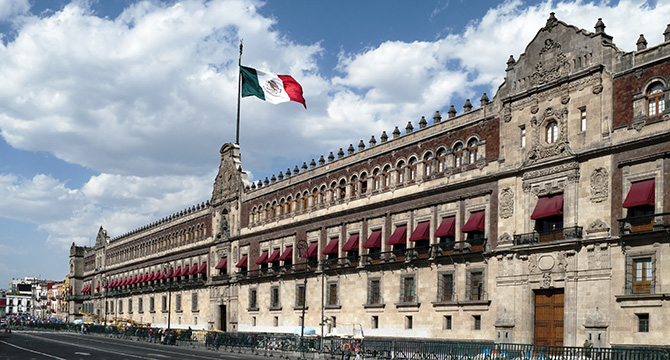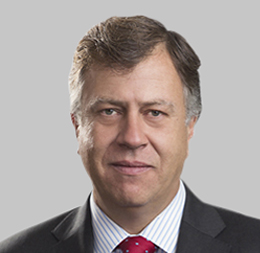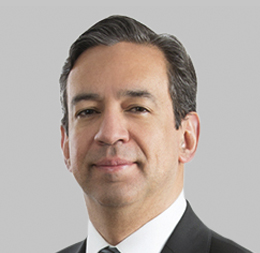
In an unprecedented election process with the participation of more than 63 percent of the eligible voters, Andres Manuel Lopez-Obrador, better known by his initials, AMLO, won the Mexican presidency with an astonishing 53 percent of the votes. His party, the National Regeneration Movement, also won a majority of seats in the Senate and the House of Representatives, as well as a majority of the eight governorships up for election.
Prior to founding the National Regeneration Movement in 2014, Lopez-Obrador, a 64-year old political scientist from the National Autonomous University of Mexico, chaired the Democratic Revolution Party (PRD) – a left wing political party – from 1996 to 1999, and served as mayor of Mexico City from 2000 to 2006.
Mexico has a lengthy presidential transition period; however, while it may be too soon to determine the manner in which Lopez-Obrador will govern and exercise his presidential authority, this client alert intends to provide an overview of his background, his campaign proposals and his team. Additional client alerts addressing specific subject matter that may impact investments and businesses in Mexico, such as energy, infrastructure, public safety and security, anti-bribery and trade, will follow.
Lopez-Obrador is the first socialist president democratically elected in Mexico. His 18-year campaign platform (he has run for president in the past three elections) has ranged from an open conflict against the establishment to a more moderate approach to certain topics, such as energy reform and economic policies. He has continuously supported a strong fight against corruption and a strong application of the rule of law.
In the first few days following the election, Lopez-Obrador met with Mexican President Enrique Peña-Nieto, representatives of industry and commerce, and others, including the U.S. secretaries of State, Treasury and Homeland Security, as well as with Jared Kushner, White House senior advisor and son-in-law of President Trump. AMLO has also supported the autonomy of the Mexican Central Bank and the application of current macroeconomic policies, which have resulted in a 20-year long stable economic environment in the country. These statements, along with his anticorruption and government reduction promises, have resulted in moderate support from businesses and industries, as well as from other groups originally adverse to Lopez-Obrador’s candidacy.
His campaign proposals can be summarized in eight major topics:
- Policy and Government: (i) having a government that promotes political, economic and social development for the country; (ii) government austerity complementing a fierce fight against corruption; (iii) open and efficient government; (iv) government downsizing.
- Education and Science: (i) review Peña-Nieto´s educational structural reform; (ii) generalize public education at all levels; (iii) guarantee college acceptance for young students; (iv) organize a comprehensive educational plan with parents, teachers and specialized educators.
- Economy and Development: (i) zero debt; (ii) reduce income tax to 20 percent in border areas; (iii) support the autonomy of the Central Bank; (iv) reorient public expenditures; (v) avoid increasing or creating new taxes.
- Security: (i) create a Ministry of Public Safety at the federal level; (ii) professionalize public prosecutors and investigators; (iii) establish a central police command with 32 state offices, one for each state in the country.
- Health: (i) strengthen the public health system; (ii) provide for free medicine and healthcare services for people without social security services; (iii) develop and implement public policies for the national production and acquisition of medicine, mainly active ingredients and biotechnologies.
- Sustainability: (i) establish a general water law as a human right; (ii) develop a national plan to adapt to climate change; (iii) provide for a sustainable use of biodiversity; (iv) develop sources of renewable energy; (v) support underprivileged populations maintaining their natural heritage.
- Foreign Affairs: (i) maintain a multilateral foreign policy with a new dialog with North America to foster cooperation for development; (ii) work with the international community to prevent the use of tax havens; (iii) comprehensive development in areas with high immigration indexes; (iv) enter into an alliance with the United States, Canada, and Central America to promote employment.
- Social Development: (i) state social policy addressing attending poverty through income supplements and continue with the development of skills; (ii) address vulnerable youth; (iii) incorporate sports and exercise into the population; (iv) provide scholarships for youngsters who are neither studying nor working.
The team and likely cabinet members during Lopez Obrador’s presidency will be mostly scientists and college professors specializing in their corresponding fields, which in turn will fit the ministries that they may hold. These individuals come from a wide range of backgrounds and are supported by a wide range of groups. This combination may result in a cabinet that is well supported by various influential groups in the country.
Some of the high-profile individuals are:
Alfonso Romo, a well-regarded wealthy businessman with interests in the biotechnology sector, who may be Lopez-Obrador´s chief of staff.
Olga Sanchez-Cordero, a former Supreme Court justice and highly regarded attorney who is expected to head the Ministry of Interior.
Alfonso Durazo, who will likely head the Ministry of Public Safety, has a longstanding career in the Mexican government, holding various positions in past administrations.
Carlos Urzua, who may head the Ministry of Finance, is a research professor at the Colegio de Mexico – a Mexican think tank – and was the Secretary of Finance when Lopez-Obrador was mayor of Mexico City.
Graciela Marquez will probably head the Ministry of Economy. She is a research professor and has academic experience in universities such as the University of Chicago and Harvard.
Esteban Moctezuma has also held high-level positions in prior administrations and is expected to head the Ministry of Education.
Miguel Angel Torruco is a well-regarded expert in tourism policies. He was the Secretary of Tourism for Mexico City (2012-2017) and is expected to head the federal Ministry of Tourism.
Marcelo Ebrard will head the Ministry of Foreign Affairs. A longstanding politician, former undersecretary of Foreign Affairs (1993-1994), and mayor of Mexico City (2006-2012), he has been close to AMLO for a long time.
Having a majority of seats in the Senate and the House of Representatives, Lopez-Obrador will have only the Mexican Supreme Court, the media and the general public/citizens as a balance to his exercise of authority. We will have to see how long his administration swings the pendulum and how much support/acceptance he will continue to gain or not during his administration. One thing for sure is that he now carries the substantial and diverse expectations of over 50 percent of the Mexican voters who gave him an unprecedented vote of confidence.
The next relevant dates related to this process will be:
- September 1, 2018: Newly elected legislature is sworn in.
- September 6, 2018: (As expected) Elections Tribunal validates the presidential election.
- December 1, 2018: President-elect takes office.
- December 15, 2018: 2019 budget is presented to Congress.
- December 31, 2018: 2019 budget is approved by Congress.
- February 1, 2019: President presents to the Senate the Public Safety National Strategy.
- February 28, 2019: President sends the National Development Plan to the House of Representative for approval.
Within this process, the approvals of both the 2019 budget and the National Development Plan will be instrumental to the new administration, as they will be indicative of the manner in which the new administration intends to reorient the budget and its plans for its term.
As mentioned above, additional client alerts addressing specific subject matter that may impact investments and businesses in Mexico, such as energy, infrastructure, public safety and security, anti-bribery and trade, will follow.






